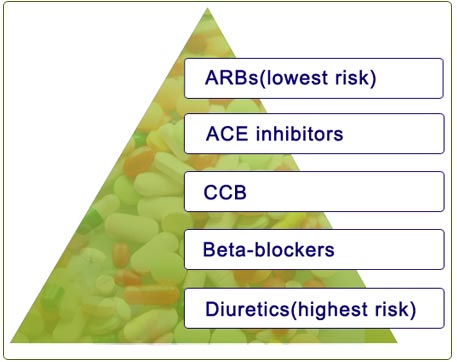More than a billion individuals suffer hypertension, the silent killer. Clinical trials have underlined the significance of antihypertensive drugs. The commonly used drugs to combat hypertension (high blood pressure) belong to the //following classes: angiotensin converting enzyme (ACE) inhibitors, angiotensin receptor blockers (ARB), calcium channel blockers (CCB), beta-blockers and diuretics. The inclination of some of these antihypertensive drugs to give rise to diabetes has been known since at least 1958. They lower the glucose tolerance of the body.
This discrepancy is the rationale for the very fact that a consensus on the selection of drug regimen is yet to be reached. There is a clash between the available guidelines. When the Seventh Report of the Joint National Committee on Prevention, Detection, Evaluation and Treatment of High Blood Pressure recommended the use of a diuretic in uncomplicated cases of hypertension, the UK National Institute for Health and Clinical Excellence insists diuretics or beta-blockers to be used only as third-line or fourth-line agents.A network meta-analysis was done to compare the association of these drugs with incident diabetes. Data from 143,153 patients in 22 clinical trials were analysed and the results were published in Lancet, the leading medical journal. Angiotensin receptor blockers (ARBs) appear to have the lowest risk of precipitating diabetes. Angiotensin converting enzyme (ACE) inhibitors come in second in terms of the lowest risk. Third were the calcium channel blockers (CCB). Beta-blockers and diuretics occupy the fourth and fifth positions respectively.
Thus beta-blockers and diuretics are associated with increased incidence of diabetes in hypertensive patients. Should hypertensive patients become diabetic just because guidelines advise to use diuretics as first-line drugs? Statistics reveal that more than 20 million patients are on diuretics and an almost equal number on beta-blockers. It might partly be the involved economic costs in treating patients with diabetes that the UK National Institute for Health and Clinical Excellence recommended diuretics or beta-blockers to be used only as third-line or fourth-line agents.
Based on the current evidence, the association of antihypertensive drugs with incident diabetes is thus (from lowest to highest):
• ARBs (lowest)
• ACE inhibitors
• Beta-blockers

More conclusive studies are however required.
Source-Medindia














